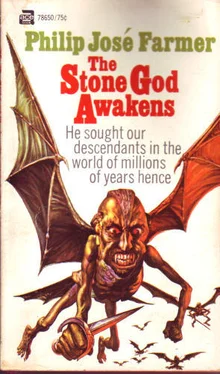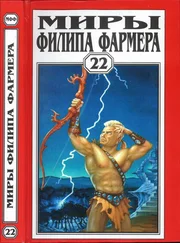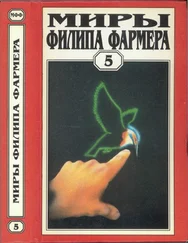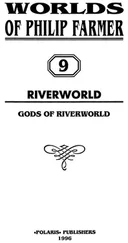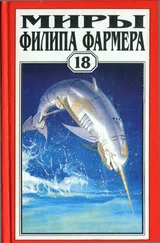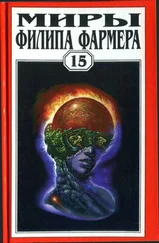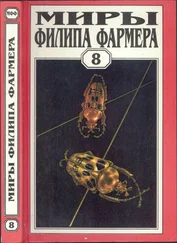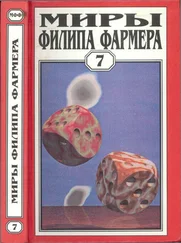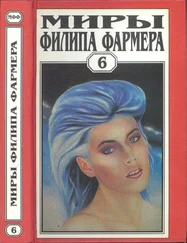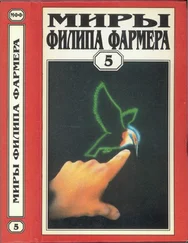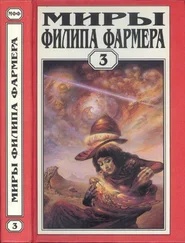"That may well be true," the high priest said. He looked with dark blue eyes from under the triple-horned hat at Ulysses. "Your explanation may well fit the facts and yet not conflict at all with the official explanation that Nesh dictated the contents. After all, whoever made the disk did so because Nesh required him to do so."
Ulysses bowed. There was no sense in arguing against this.
"Do you now understand that The Tree is a sentient entity and is our enemy?" Kuushmurzh said.
"The Book told me that this is so."
The high priest smiled and said, "But you do not necessarily believe the Book?"
Ulysses though it best not to answer. He could have said that much of the Book's contents were true, but that the disk was made by sentients, and any creature of flesh and blood could make mistakes or be in error. But the high priest would only reply that the disk could not be wrong, since Nesh had dictated its contents, and Nesh, the only god, could make neither mistake nor error.
When he returned to the airfield, he had changed his attitude toward Thebi. She was no longer the potential mother of his children. He doubted very much that she or any slave or Vroomaw could conceive by him. Though she looked like a slightly altered form ofhomo sapiens, she probably had a different chromosomal makeup. She would be barren as long as he was her only mate. Enough time had gone by that she had proved that.
Of course, it was possible that she was sterile no matter who her mate was. But Lusha had been with him long enough to conceive, too. Again, it was possible that she, too, was sterile. Or that both women, unknown to him, were secretly using methods of birth control. This did not seem likely, since he had never heard of such among any peoples he had encountered. Fertility was as revered now as in the first Palaeolithic age of Earth.
During the months that followed his first visit to the temple of Nesh, he found some time to make other visits. Though he was not allowed to read the Book of Tiznak again, he could explore the underground city, or museum, as he thought of it. He found many things the purpose of which he figured out, though many were useless because he did not know how to power them. He did find a device which had not evolved so far from those he knew in his time as to be unrecognisable. He took tissue slides of his skin and of a number of slave women and put them in the matcher. The tissues of the slave women turned scarlet when placed next to his. He could not breed with them.
That was that. He pushed aside the device with a feeling of disappointment. Yet, somewhere in him, was a tickling of elation.
He put the faint good feeling aside. It had to go. If he let it build up into something strong, he would then have to suffer guilt.
But why should he? he told himself. He could not help it that he could not be the father of a new breed of humanity. Nor was it vital that Earth know mankind again. Mankind had almost destroyed the Earth. The flying teardrops had made a point of exterminatinghomo sapiens but had left the other sapient beings alone. Not that they were any less evil potentially. But they had not done anything evil to Earth as of then, and so they had been spared.
Why should he generate his pernicious and destructive breed again?
No reason at all. But he did feel guilty because he was unable to.
He also felt guilty because he preferred Awina to Thebi or any of Thebi's kind.
This explained why he kept Thebi on as his personal servant and then added another human slave. He still called them human, which, in a way, they were. This was a golden-skinned, green-eyed girl called Phanus. She was as bald as any, but her chin was less jutting and her features were very pleasing.
Awina said nothing when Phanus reported to his office. She gave Ulysses a sidelong glance that told him much and made him feel guilty about his treatment of her. To compensate, he put the two women under the immediate supervision of Awina. He might have known that this would make their life, if not a hell, extremely unpleasant at times. But he was too busy with his air force to notice such things for a long time.
The time came, at last, when the first dirigible was finished. The great silvery craft had twelve powerful motors in six nacelles and could carry many men or many bombs or a compromise load of the two. By then, at Ulysses' repeated demands, the quarrel between the navy and the army had been settled. Both had claimed that the aircraft and personnel should come under their jurisdiction. The result was that Ulysses was hampered in getting material, personnel or decisions. Finally, he stormed into the office of the Grand Vizier and demanded that a separate branch be created. Right then and there. Otherwise, there would be so many delays, the enemy would have time to organise another attack. And this would be a fullscale invasion, not a raid.
Shegnif agreed, and made Ulysses the admiral of the fleet, though not head of the air force. He gave this position to his nephew, Graushpaz. Ulysses detested him, but he could do nothing about him. Then his investigation into the cost of the supplies he had been getting, and the inferior quality of much of it, exploded in everybody's face. Shegnif tried to repress the findings of Ulysses' investigators, but Ulysses got the report to the ruler, Zhigbruwzh.
Graushpaz, the nephew, had been selling the air force the inferior goods.
Moreover, a human officer got the courage to come to Ulysses and tell him that the humans in the air force were about to riot because of the bad food they had been getting. Graushpaz had been selling the food to the air force.
Ulysses agreed to plead for the nephew if there would be no more profiteering and delays.
Shegnif agreed, but he did insist that Graushpaz be kept as head of the air force. Otherwise, Graushpaz would have to commit suicide, and he, Shegnif, would be disgraced.
"Everybody knows that he's guilty!" Ulysses said. "Why isn't he disgraced?"
"Everybody knows, true," Shegnif said. "But unless he is publicly disgraced, he does not have to kill himself."
"I won't put up with any more of his crooked deals," Ulysses said. "And I insist that he not come with us when we go after the Dhulhulikh!"
"He has to go with you," Shegniff said. "That is the only way he can redeem himself. He must do something outstanding in war to make up for being caught."
Ulysses gave up on that issue. Later, he smiled wryly about it. The sin was in being caught. The elephantine Neshgai were not too much different than humankind.
He did not smile when Shegnif continued his policy of overloading the dirigibles with Neshgai officers. Despite Ulysses' high standing with the ruler and the high priest, he was not entirely trusted by the Grand Vizier. His attitude was understandable in view of the revolt that had occurred ten days before in a border town. The Vroomaw soldiers had refused to obey orders that they live in the slave barricades. Apparently, they felt that it was a disgrace to be quartered with slaves. When the Neshgai moved in other troops to deal with them, the new troops had sided with the rebels. Neshgai soldiers had been brought in, and there had been a battle. The slaves had taken advantage of this to massacre some of their Neshgai masters. Eventually, the Neshgai had called in more of their ponderous forces and had crushed the revolt.
News of this had spread to the entire human population. There was so much tension, and so many precautions by the Neshgai in the capital, that Ulysses' work was seriously delayed.
Then the situation eased for him when an army of about three hundred bat-men made a raid on the airfield. This time they were detected by the scouts Ulysses had stationed on the edge of The Tree. He had a chance to send up five of his dirigibles with their load of archers, ballista men and hawks. The hawks got their first taste of blood, and the air force found out how much good its training and discipline had done it. They suffered some casualties, but all ships returned. The bat-men, after suffering heavy casualties, flew away.
Читать дальше
